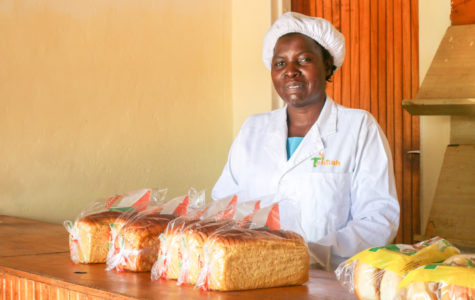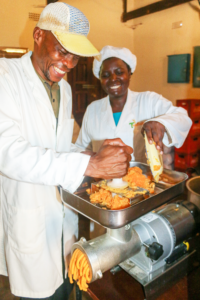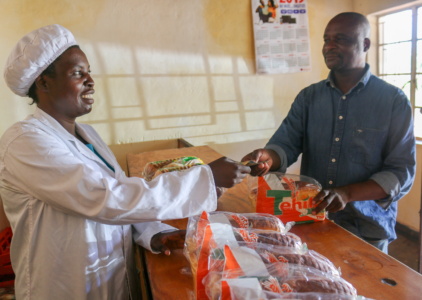After six years of helping others add value to their businesses, Malawian food technologist Jean Pankuku was so convinced of the nutritional merits and commercial prospects of orange-fleshed-sweetpotato (OFSP) breads and other baked products that she opened her own business – the Tehilah Bakery and Value Addition Centre. It’s hardly a surprise that the Chicago-based Institute of Food Technologists recognized her achievements and future potential in 2017 by bestowing on her its coveted Emerging Leaders Network award.

The Tehilah Bakery and Value Addition Centre, located 20 kilometers from Malawi’s second largest city, Blantyre, focuses on commercializing nutritious and healthy foods using locally grown crops. Jean founded it after years of helping other Malawian businesses develop commercial products based on a range of crops.
The bakery produces and sells innovative foods based on root and tuber crops. It was therefore only natural that Jean partner with the International Potato Center (CIP), which is implementing a five-year project called Root and Tuber Crops for Agricultural Transformation (RTC-ACTION) in Malawi. Funded by Irish Aid, RTC-ACTION is implemented by CIP and the International Institute of Tropical Agriculture, in collaboration with local partners.
RTC-ACTION works with the private sector to enhance value addition in cassava, potato and sweetpotato market chains. CIP acts as the initial link, connecting farmers and local businesses that can buy their surplus production and transform it into nutritious foods. CIP’s partnership with Tehilah Bakery aims to improve the livelihoods of smallholder farmers who produce cassava, potato and OFSP, many of whom face major challenges in marketing their crops.

“I established a partnership with CIP focused on perfecting various products made from OFSP, as well as promoting them in urban markets. When new varieties are released, I assess them to determine their suitability for products such as puree, crisps among others,” said Jean. So far, her favourite OFSP varieties for processing are Kadyaubwerere and Chipika, both bred and released by Malawi’s Department of Agricultural Research Services in collaboration with CIP.
Officially registered in March 2017, Tehilah began by conducting taste tests in various forums, including training sessions of CIP partners. Tehilah’s OFSP-based products were highly rated by the tasters, who were impressed by the fact that the bread is also a good source of vitamin A. CIP then supported the bakery in getting its products certified by the Malawi Bureau of Standards, in August 2018. This cleared the way for the OFSP bread and buns – the first of their kind in Malawi – to be sold to consumers.
Tehilah Bakery has six full time employees and hires part-time staff when needed. Though relatively new, its OFSP and cassava bread and buns have rapidly gained popularity. While consumers like their flavor, development partners recognize the potential of these innovative products for creating a new market for relatively poor, small-scale farmers. Jean’s determination helped her gain support from the United Nations Development Programme, which will enable her to acquire additional bakery equipment needed to keep pace with rapidly rising demand.
“As sweetpotato is a seasonal crop in Malawi, I have ordered additional freezing equipment to freeze enough puree during periods of abundance for use when OFSP is scarce,” noted Jean.
Once the bakery starts operating to full capacity, the farmers who supply it will be able to intensify and expand their OFSP production. Jean also plans to add new products, including OFSP-based biscuits, over the next two or three years, which will further increase the bakery’s demand for sweetpotato.
In early 2019, the bakery was on course to buy 20 metric tons of OFSP roots to make puree, which it substitutes for 40 percent of the wheat flour used to make bread and buns. “This year, we hope to take our production higher, to a minimum of 5,000 loaves of OFSP bread each month. With promotion, we are seeing more demand for this bread,” Jean said.

Substitution of expensive wheat flour with OFSP puree has reduced Tehilah’s production costs. “When I do the costing with products made from 100 per cent wheat flour, and compare this with OFSP based products, my profit margin is 10 per cent higher with OFSP products,” Jean explained. She added that OFSP’s natural sweetness means she doesn’t have to use a lot of sugar in the bread, resulting in lower costs and healthier products.
Malawi spent more than USD 30 million on imported wheat in 2017, so such innovations have the potential to reduce the trade deficit if adopted on a national scale. In the foreseeable future, Tehilah’s target is to purchase over 50 tons of OFSP roots per year for production of bread and other products. Given the market price of USD 0.21 per kg, this means that local farmers will share more than USD 10,000 annually.

This is just the start for Tehilah. Jean plans further diversification with new baked products based, as well as selling fresh potatoes, sweetpotatoes and cassava, all of which contribute to improved nutrition for consumers and farming families.
As the bakery’s production grows, so will farmer demand for quality planting material – essential for achieving high yields – for varieties released with the qualities that the bakery needs. This will in turn generate income for decentralized vine multipliers: small-scale entrepreneurs who CIP and partners have trained to produce and sell quality sweetpotato planting material. So the value chain will extend from vine multipliers to farmers to Tehilah staff.
Blog by Felistus Chipungu, CIP Malawi, and Keith Sones with contributions from Vivian Atakos, Regional Communications Specialist – CIP SSA.
